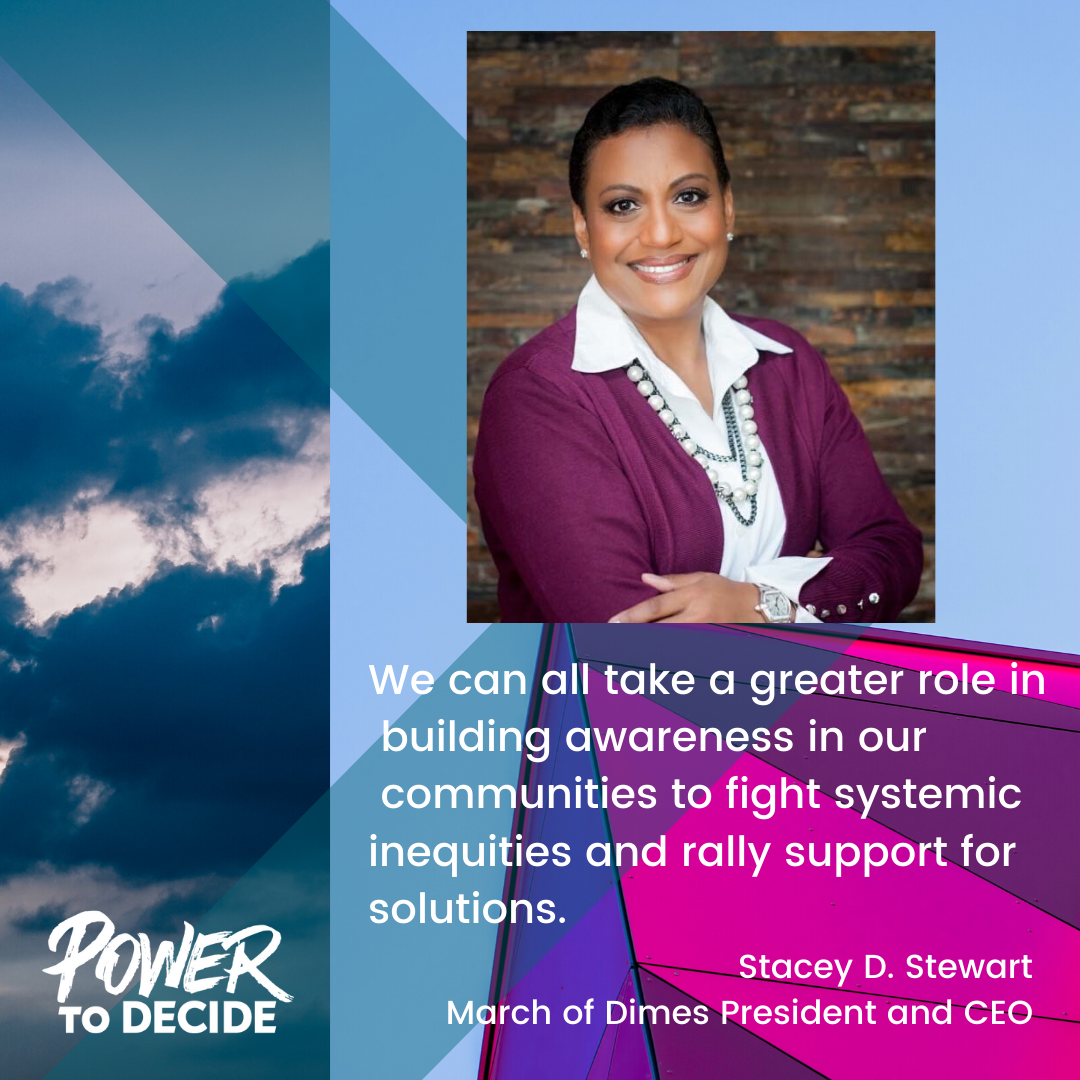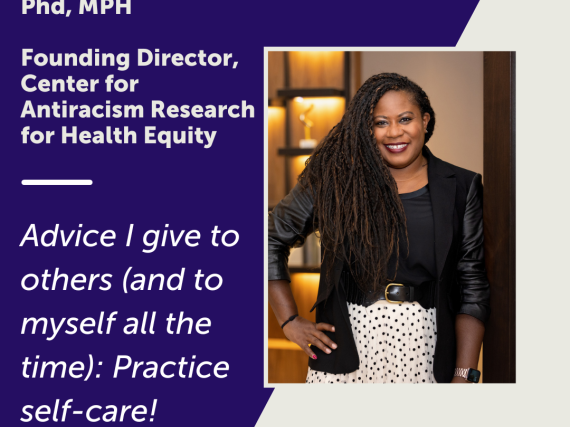5 Questions with Stacey D. Stewart, President & CEO, March of Dimes
March of Dimes is a national non-profit organization fighting for the health of all moms and babies. The Arlington, VA-based organization began that fight more than 80 years ago as an organization dedicated to eradicating polio, a goal they achieved. Today, March of Dimes works to address some of the biggest threats to moms and babies, such as premature birth and maternal mortality through research, education, programs, and advocacy. As a non-partisan organization, March of Dimes fights to ensure that all women who choose to have a baby have the information and resources necessary to have a healthy pregnancy and childbirth. Alongside Power to Decide, they recently announced their support for the Momnibus Act, which aims to improve the lives of Black mothers by reducing disparities in maternal health.
March of Dimes President and CEO Stacey D. Stewart recently talked with us about her experiences as a mom and a professional whose work is devoted to supporting healthy moms and babies.
Black women are more than three times as likely to die from a pregnancy-related death than their white counterparts. What do you think needs to change (or start to happen) to improve health outcomes for Black mothers and their babies?
Yes, that’s correct. The statistic is eye-opening and an important data point regarding the state of maternal and infant health in our country. The fact is, every 12 hours a woman dies due to complications resulting from pregnancy and every two hours, we lose a baby. Women of color reading this won’t be surprised to learn this problem doesn’t affect all American women equally. For Black and Brown women who are age 30 or older, the number of pregnancy-related deaths per 100,000 live births is approximately 4 to 5 times that of white women. Black women also have a preterm birth rate that’s 50% higher than that of white women.
The causes of our nation’s maternal and infant health crisis are complex and include physical health, mental health, social determinants, and much more. They can be traced back to issues in our health care system, including quality of care, systemic problems, and implicit bias. They stem from factors in our homes, our workplaces, and our communities.
There are several things we can do to improve health outcomes and address inequity head on. First, we can all take a greater role in building awareness in our communities to fight systemic inequities and rally support for solutions. Second, we can advocate for state and federal policies that protect the health of moms and babies. In an election year, that’s more important than ever. Third, we must put equity front and center in the fight for the health of all moms and babies. On the national level, policymakers must support legislation that improve data collection, helps end provider bias toward women of color, improves access to health care in places where there are few maternity care providers, and extends Medicaid coverage to women for a year after pregnancy.
Black women encounter discrimination and bias in clinical and health-care settings from providers, which contributes to disparities in care. Advocating for oneself in the exam room is crucial but can be extremely difficult. How would you advise expectant mothers, especially Black moms, to stand up for their needs? What can others do to lend support?
This is such an important issue that you’re raising. There’s a long, storied history of implicit bias in the health care system, where African American women receive inferior care. And, it’s a burden to feel that we must push back against a medical establishment that often dismisses us. But it’s your health care providers’ jobs to take care of you. I encourage all women to speak up and ask questions if they feel their provider isn’t listening to them or acting in their best interest.
I’m proud that at March of Dimes, we’re pushing back against systemic bias and stigma by launching implicit bias training for health care providers. We are working alongside an expert organization with a proven track record to develop a unique learning experience that is authentic and compelling for clinical providers caring for women in the preconception, pregnancy, and/or postpartum periods. The curriculum will cover an understanding of origins of implicit bias, a historical overview of structural racism in our country, strategies to mitigate racial bias in maternity care, and a commitment to create a culture of equity. This is a critical feature that demonstrates how lessons learned during the training can be extended to create system-wide change.
Has your experience as a mom changed the way you approach your work with March of Dimes?
I am the proud mother of two beautiful daughters. While I was fortunate to have two healthy pregnancies, I witnessed close friends experience loss and miscarriages. I know that as an African American woman I was considered blessed to carry my daughters to term. I come to work every day committed to ending the maternal health crisis in this country. It is my goal that when my girls are ready to have children of their own, birth outcomes for all women and especially women of color will have greatly improved.
As a working mom, it is important to me that I prioritize moms and families at March of Dimes. For example, when we moved our headquarters to the Washington, DC area, I ensured that nursing rooms were included in the office design so that both lactating staff and visitors could pump in a comfortable space. I also revamped our maternity and paternity leave policy because we know how important it is that mom spend time with baby in those first few months. I remember that is was an incredible stressful time when my daughters were born. I felt the need to choose between work and motherhood. At March of Dimes, I want our employees to feel empowered and know that the balance is possible.
What did you learn during either of your pregnancies that you want other expectant mothers to know? Is there anything you’ve learned in your role at the March of Dimes that you wish you’d known then?
While I always knew I wanted to be a mom, I took time to establish my career first. As a result of life’s circumstances, I became a mother later in life. I am so thankful that I was fortunate enough to have a safe pregnancy even though there was an increased risk due to my age. My father, who was a physician, taught me to prioritize my health and live a healthy lifestyle. I am certain my overall good health positively contributed to the birth of my daughters. While good health alone does not prevent all pregnancy complications, it helps to get your pregnancy off to a good start. It is so important that women focus on their health early on in their lives and continue to do so before they become pregnant. I would also encourage all expectant mothers to manage their stress as best they can especially in these uncertain times. A healthy lifestyle includes managing stress, eating a healthy diet, getting enough sleep, and taking care of your mental health.
How can allies advocate for and help reduce disparities in Black maternal health without talking over the voices of Black people? What is one thing you wish everyone knew – and would do—to lend support?
First, we have a proud legacy of working with health care providers, hospitals, corporate partners, pregnant woman, and their families, as well as many others across the country to address the maternal and infant health crisis our country is facing. We have always convened different and varied voices around the table because these are issues that can’t be solved by one person or organization alone.
I also think all women, men, and children have a voice to share because these are issues that should concern all of us. We have a lot of work to do as a country and I think the more people who speak these hard truths, the more powerful and impactful our voice will be. I would also ask anyone who wants to get involved, but doesn’t know where to start, to reach out to us. We offer a variety of ways to make a difference -- from volunteer opportunities, to advocating on federal and state policies, to making a donation to support critical research that will help save lives.
What is March of Dimes doing in light of the current pandemic to support maternal and infant health?
Unfortunately, the COVID-19 pandemic is only compounding the current maternal and infant health crisis facing our nation. We, like many others, are concerned about pregnant women and babies who may be at greater risk of becoming sick and not receiving the care they need. As we face this public health crisis together, it is more important than ever that we come together to support moms, babies, and families. To that end, we’re sharing important health information on MarchofDimes.org and our social media channels (@marchofdimes) every day.
Last month, we also launched the COVID-19 Vaccine and Support Fund to address the urgent need for research, advocacy, and education to protect moms, babies, and families from COVID-19 and the unknown future effects of the virus. We have a responsibility to direct efforts, including funds, to deliver on the unmet needs of the populations we serve, most notably, women who may become pregnant, pregnant women, and newborns. In far too many cases, especially as it pertains to vaccine research and testing, pregnant and lactating women are not accounted for or included in solutions and outcomes. To learn more about the fund and how you can help, please visit marchofdimes.org.


